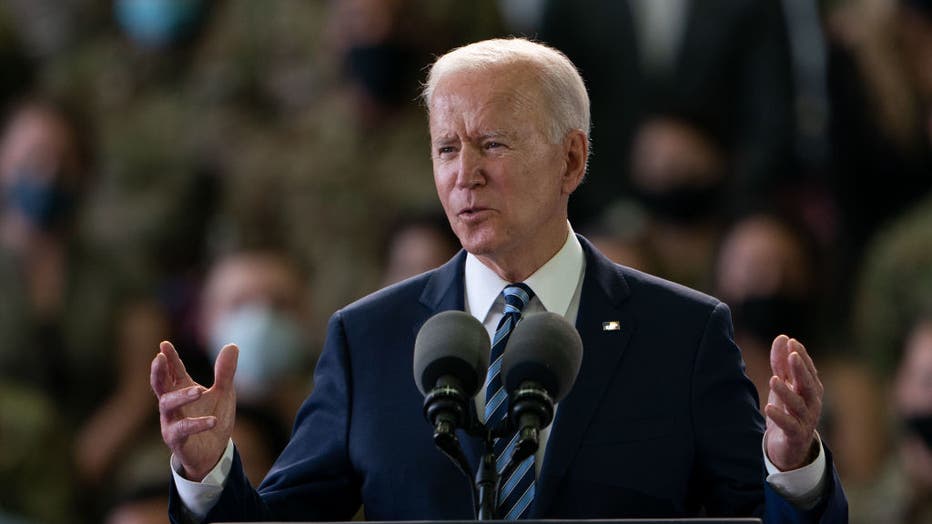White House unveils new strategy to combat domestic terrorism
WASHINGTON - The White House on Tuesday unveiled a new strategy to combat domestic terrorism, including better coordination of intelligence among law enforcement agencies and working with tech companies to better address online terrorist content.
Following a 100-day review of U.S. government efforts to address domestic terrorism, which officials called "the most urgent terrorism threat the United States faces today," the National Security Council released the new nationwide strategy. It comes more than six months after a mob of supporters of former President Donald Trump stormed the U.S. Capitol as Congress was voting to certify Joe Biden’s presidential win.
The review found that "racially or ethnically motivated violent extremists who advocate for the superiority of the white race and anti-government or anti-authority violent extremists, such as militia violent extremists," posed the highest risk in 2021, according to a White House fact sheet.
The new plan includes enhancing the federal government’s analysis of domestic terrorism and improving information sharing among local, state and federal law enforcement agencies. The White House said the Justice Department and FBI had also implemented a new system to "methodically track" domestic terrorism cases nationwide.
The Justice Department was also evaluating whether the administration should recommend Congress pass a specific domestic terrorism law, which does not currently exist. In the absence of domestic terrorism laws, the Justice Department relies on other statutes to prosecute ideologically motivated violence by people with no international ties.
But that has made it harder to track how often extremists driven by religious, racial or anti-government bias commit violence in the U.S and complicates efforts to develop a universally accepted domestic terror definition. Opponents of domestic terrorism laws say prosecutors already have enough tools.

President Joe Biden addresses US Air Force personnel at RAF Mildenhall in Suffolk, ahead of the G7 summit in Cornwall, on June 9, 2021 in Mildenhall, England. (Photo by Joe Giddens - WPA Pool/Getty Images)
The Biden administration’s new strategy also includes an effort to better screen and identify government employees who may pose a domestic terrorism threat. The Office of Personnel Management said it is considering updates to forms used to apply for federal government positions that could help screen candidates before being put in sensitive roles.
"(The Department of Defense), (Justice Department), and (Department of Homeland Security) are similarly pursuing efforts to ensure domestic terrorists are not employed within our military or law enforcement ranks and improve screening and vetting processes," the White House said.
The new strategy also focuses on working to stop extremist violence from spreading online by increased information sharing with technology companies. The U.S. and four other countries joined in a similar effort called Christchurch Call, which involves some 50 nations plus tech companies including Google, Facebook, Twitter and Amazon, and is named for the New Zealand city where the slaughter at the two mosques took place.
In May, the heads of the Justice Department and Department of Homeland Security testified about the "elevated threat" of domestic violent extremism before a Senate committee and said more resources were being dedicated to the issue.
Attorney General Merrick Garland noted how the intelligence community has labeled domestic violent extremists as an "elevated threat" in 2021 — particularly White supremacy extremists. Garland noted that it’s not a crime to espouse extremist views or associate with such hate groups, "but when someone tries to promote or impose an ideology through acts of violence, those acts can be the most dangerous crimes we confront as a society."
"We will use every appropriate tool at our disposal to deter and disrupt such criminal acts and to bring their perpetrators to justice," he told the Senate Appropriations Committee.
The Justice Department’s proposed budget for next year includes $100 million in additional resources related to domestic terrorism to be used for analysts, investigators and prosecutors.
Garland also testified about the DOJ’s ongoing investigation into the Jan. 6 Capitol riot, saying more than 430 people had been charged related to the deadly insurrection. The riot left five people dead, including Capitol Police Officer Brian Sicknick, who was hit in the head by a fire extinguisher. Sicknick was later ruled to have died of natural causes. Another officer died in an apparent suicide after the attack.
"We will pursue each lead until we’re confident that we will have reached the end," Garland said.
RELATED: Garland, Mayorkas testify on 'elevated threat' of domestic violent extremism
This story was reported from Cincinnati. The Associated Press contributed.

